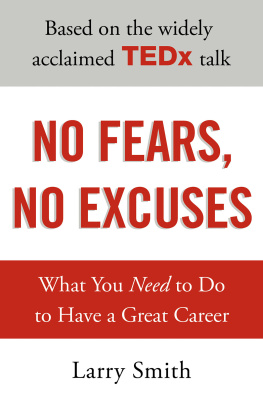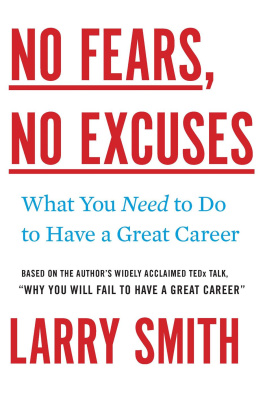Contents
Contents
ACKNOWLEDGMENTS
Any worthwhile accomplishment is always easier when you can draw on the support and talent of others. And I am deeply grateful to all those who helped in the crafting of this work. The support and encouragement of my family, immediate and extended, has been invaluable, as always. I owe a special debt to Carly Watters, my literary agent, who had to persuade me that this was a worthwhile project. Both of my editors, Kate Cassaday and Rick Wolff, provided wise counsel, and we delivered a better book because of it. I am also very appreciative of those who agreed to be quoted in the book. Finally, my collaborator, Jenna Land Free, played an indispensable role by helping me in so many different ways to give voice to this message.
APPENDIX
Preparing Your Plan
Now that you have a snapshot of what a plan might look like, its time to begin making your own. Lets look at what we covered in Part II in step-by-step form. But instead of thinking about Heather, Trent, Ricardo, Yolanda, Bart, or anyone else, consider your own way forward. If your pad and pencil or laptop are not at the ready, I must ask, why not?
Your Plan
Step 1: Determine the Destination
- What are your goals for your life?
- What are your goals for your career?
- Are you being precise, yet not pinpointing?
Step 2: Distinguish Your Priorities
- Which of your goals are the most important to you?
- Which are the least important to you?
- Are there any goals you could defer for a time? (There is no right or wrong answer.)
Step 3: Identify the Specific Barriers to Achieving Your Goals
- What are the real obstacles to achieving your goals? Dont fear them, just list them.
Step 4: Probe the Barriers and Revise Your Goals if Necessary
- How are others finding their way around obstacles?
- Are any of your goals adjustable?
- Are you trying to fit your passion into a conventional job description?
- Are there ways to fast-track a prohibitively long process?
Step 5: Identify, Acquire, and Strengthen the Skills You Need
- What skills do you need?
- What, other than going back to school, can you do to build skill?
- Have you determined how your skills can be continuously improved?
Step 6: Put Your Team in Place
- What are the parameters of your network?
- Who is on your team? How are you utilizing your team?
- Do you have a two-way relationship with your team members?
Step 7: Find Your Edge
- What are you doing that no one else is?
- Can you identify and solve an important problem?
- Can you use a tool or technique that no one else is using?
Step 8: Sell Yourself by Selling Your Idea
- How are you going to market your ideas?
- What is your elevator pitch?
- What is your first paragraph?
- What is your one-pager?
Step 9: Execute and Revise
- What are your benchmarks?
- Do you have set intervals at which to review your benchmarks?
- If you make a revision to your plan, are you sure it will move you closer to your overriding goal?
- Are you sure the time it will take to execute the plan will be worth the benefit?
- Are you certain your plan wont unnecessarily limit your options?
About the Author
Larry Smith is an adjunct associate professor of economics at the University of Waterloo. He is a recipient of the University of Waterloos Distinguished Teacher Award.
During his long-standing tenure, Smith has taught more than 23,000 students, representing more than 10 per cent of UWs alumni. And, of course, millions from all over the world have viewed his provocative TEDx talk, and the numbers continue to grow on a daily basis.
Professor Smith is also president of Essential Economics Corporation, an economic consulting practice that serves a wide range of public and private clients. The firm specialises in forecasting and in the economics of innovation and development.
He also advises UW students who start their own ventures. Smith has now worked with more than 450 teams of student entrepreneurs. Many have gone on to create companies of significant size and success. They include enterprises in such industries as communications, software, robotics, culture, entertainment, design, real estate, and professional services.
ONE
Why Good Work Is No Longer Good Enough
JOHN WAS SURE his life was on track. Upon graduation, a degree in computer science in hand, he had joined one of the worlds great and iconic IT firms. They paid well, with generous benefits, and after five years of good performance reviews, he had been promoted to team manager. John was married, lived in a large house in an upscale neighborhood, and he and his spouse were talking about children. John had even begun making contributions to a retirement account.
Charlenes life was in sharp contrast to Johns. Though she excelled in science and math in high school, she chose to study sociology because it was about people and math bored her. Upon her college graduation, the only job she was offered was at a call center. When she was told that if she worked there for five years, she might be promoted to be the team leader, she declined the position and went back to graduate school to continue her studies in sociology. When in doubt, go to school, had been her motto. Nearing her second graduation, Charlene found that her employment options included high school teacher, and little else. (Ideally she would have researched this much earlier on, but more on that later.) Charlene may not have been sure what she wanted, exactly, but she knew with certainty that she did not want to be a high school teacher. To buy time, Charlene took a clerical job, filing and fetching.
Today one of these people has upward momentum, financial success, and security; the other is stalled, with few opportunities for improvement. One is confident; one is apprehensive. Perhaps you think you already know which is which. But you are wrong if you think Charlene is the one who is doomed to struggle.
Why John Struggled: Competition and the Demise of the 9-to-5er
If this had been 1980, Johns comfortable world would have been assured. But he was born too late. When his general manager asked to see him one day, John had no idea he was at risk. Indeed, it took a few minutes before John recognized he was being terminated.
It made no sense. His company was growing and profitable; his performance reviews were favorable; he had done nothing wrong. The manager was vague, citing changing corporate priorities, and talked about severance. John was still numb when he read in the news media the following day that his employer had laid off hundreds of employees because their skills were deemed inadequate. Now John was mystified; hed never failed at any task he was given, so how could he be judged to be deficient?
Actually, there was little mystery about why John found himself in this difficult position. Hed been sucker-punched by outside competition and kicked in the head by technology. The warning signs had long been there, had John cared to notice them. For several years, the business media had covered his employer unfavorably. There was much commentary about the company missing recent new developments in IT, while other companies advanced on its markets. It was criticized for losing its competitive edge. In my conversation with John it was clear that he had paid no attention to these concerns and was barely aware of them. Were still profitable, he noted, correctly. (And I noted he was still saying we when, in fact, he was no longer part of the team.) John went on to insist that since the company was profitable, the media criticism was unfair.















